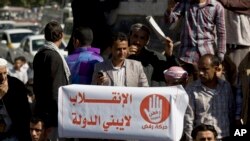Thousands of Yemenis marched in protest Saturday against the Shiite rebel Houthi group, two days after the resignation of the president and the government.
Witnesses say demonstrators marched from a square near Sanaa University toward what had been the homes of the country's leaders in the capital.
On Friday, senior U.S. security officials said U.S. counterterrorism operations had been suspended in Yemen, following the collapse of the U.S.-backed government.
Sources close to the situation said the resignations of Yemeni President Abd Rabbuh Mansour Hadi and the government of Prime Minister Khaled Bahah had left U.S. anti-terror operations in the country "paralyzed."
The Reuters news agency quoted three U.S. officials as saying the halt in operations included drone strikes. It wasn't clear how long the suspension would be in place.
U.S. forces work alongside Yemeni security personnel in monitoring al-Qaida on the Arabian Peninsula, or AQAP, from a key intelligence post in southern Yemen. But officials late Friday said much of that intelligence operation was now controlled by Houthis, who seized key government installations Thursday and forced out the government.
Houthi rebels are opposed to AQAP, as well as the United States.
Meanwhile, Yemen's political future remains unclear, with parliament preparing to decide Sunday whether to accept the resignation of Hadi.
Reuters quoted the president Friday as saying the government does not want to be involved in "an unconstructive political maze."
Both pro- and anti-Houthi rallies were held across Yemen Friday, but reports from the capital said the situation was relatively calm.
In Sanaa, U.N. envoy Jamal Benomar called on all parties to "engage in inclusive consultations with each other that will produce an agreement on how to move forward from the current crisis."
U.S. Secretary of State John Kerry, speaking at an economic forum in Switzerland, voiced concern over the growing crisis.
"Governance has been challenged by an al-Qaida-affiliated terrorist organization that has launched attacks inside and outside of the country, by a secessionist movement in the south, and most recently by a rebel movement in the north that has now spread across the country and challenged the sovereignty of the entire state," said Kerry.
Earlier Friday, the U.S. Defense Department described the situation in Yemen as "still very unclear" and said the United States did not yet have a "full picture."
U.S. State Department spokeswoman Jen Psaki said U.S. officials were in touch with what she called a "full spectrum of political leaders" in Yemen. She said the Houthis are a legitimate political constituency and have a right to participate in the government, but that the United States condemns their use of violence.
Former U.S. Ambassador to Yemen Barbara Bodine told VOA that while the full extent of Houthi demands is not clear, Washington does share common interests and should consider working with the rebels.
"I do think there is room for us to work with this group, and I think we have to work with this group," she said. "The Houthis are a political reality in Yemen."
The Houthi motto is: "God is Great, Death to America, Death to Israel, Curse on the Jews, Victory to Islam." Analysts say those views have created doubts about the extent to which they would be willing to work with Western countries.





